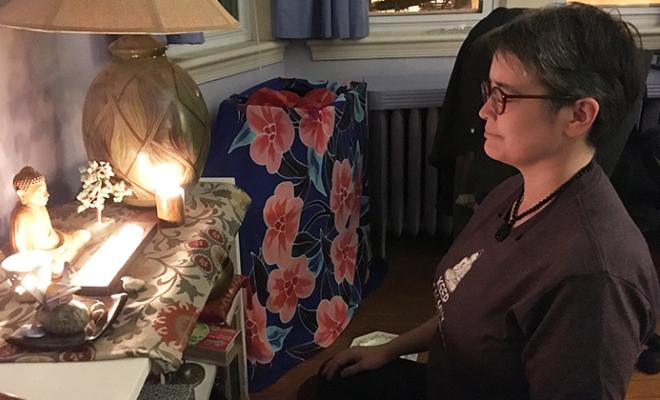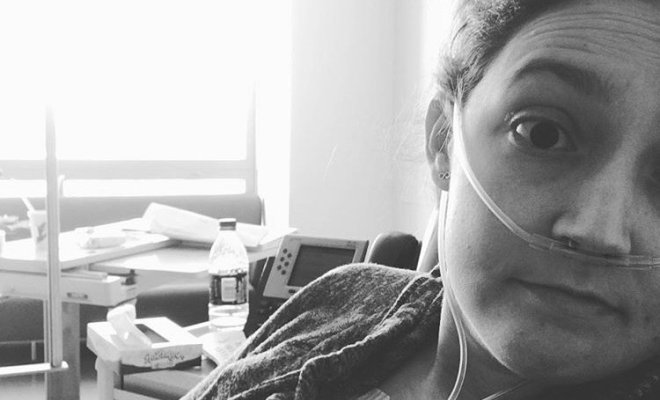My nurse (Cindy) and my doc had done their best to prepare me. My parents had done their best. Diagnosed with cystic fibrosis at birth, I'd been prepping for this moment for 18 years.
At a clinic visit when I was 13, my doctor told me that I would, from then on, spend half an hour of my visit alone with the care team. No parents letting me off the hook by asking the questions I wondered about. No barrier to asking the scary questions I didn't want my parents to hear about. Just me and my team.
And that was the key -- they were reminding me that it was Team Eliza. I am the captain of my own ship, and it's my job to make the final decisions. I can listen to the medical advice and remember how taking a certain medication has gone before, but in the end, it's my call whether I put that pill in my mouth. The clinic's plan to have me on my own at 13, even for only part of the visit, was a genius way to teach me my own power.
I was scared at first, and I think my parents were too. It's difficult to let go of 13 years of hard-won knowledge of your child's body, to see that she will be a woman. But, my parents talked to me about it, and we went slowly.
Five years later, I had to have bowel surgery in January of my senior year of high school. After surgery, my surgeon was clear. “Next time, tell them to give you enemas, a machine gun-grade laxative, and lots of fluids, and see if that works before they open you up.” I had spent a month recovering, missing school, and feeling awful. His advice made sense to me.
Meanwhile, my indomitable nurse Cindy had received a grant to teach self-advocacy to her teenage patients. She had booklets, lessons, and role-play exercises for me. I learned to be firm, to know my own body, and trust that knowledge. I learned to speak louder and mumble less.
Soon after, I turned 18 and started college 6 ½ hours away from my parents. It wasn't long before I started showing the signs of a bowel blockage. I was throwing up, my belly was round like a sumo wrestler, and I felt awful. I got my new college roommate to call me a cab (This was 1992, and there was no Uber!), and I went to the local hospital. I was admitted, and in came the surgeon.
“I need to do surgery, so you'll need to sign this paper,” he said. He seemed sure I would; he was used to being obeyed.
I explained, as politely as possible, that he needed to call my former surgeon, or my CF doctor. “They will tell you to give me enemas, a laxative, and lots of fluids. I will not sign to have surgery until they are consulted.”
“If I had your parents here, they would sign,” he growled. I was certain that this was not the case. I was the captain of the U.S.S. Eliza, and my parents were fully on board with that. They trusted me. My clinic team had laid that path.
He spent half an hour browbeating me, trying to guilt me, ordering me to comply. Was there a part of me that said no from stubbornness? If there was, I will only say that his certainty made me nervous. He was not a CF doctor, and he had none to advise him. I understand his anxiety to get me under his knife -- he was worried I would get desperately ill. But, he was wrong not to listen to my request that he consult my home doctor.
After he left, I cried. The nurse came in and said, “He's a very good surgeon.” She paused and said, “He doesn't have a very good bedside manner.”
He returned, trying all his blustering best to get me to sign the paper he waved in my face. But, I was firm, I was clear, and I was right. A few hours later, the nurse whispered conspiratorially that my doctor had, at last, been called, and I would be receiving an enema, a strong laxative, and lots of fluids.
Teaching teenagers -- young teenagers -- to take control of their own health is crucial to becoming an adult. Practicing self-advocacy was empowering and kept me from having unnecessary surgery. I learned that my clinic and my parents trusted me and expected me to take ownership of my disease. Cystic fibrosis is a team effort, but the patient has to be the captain of her own ship.





